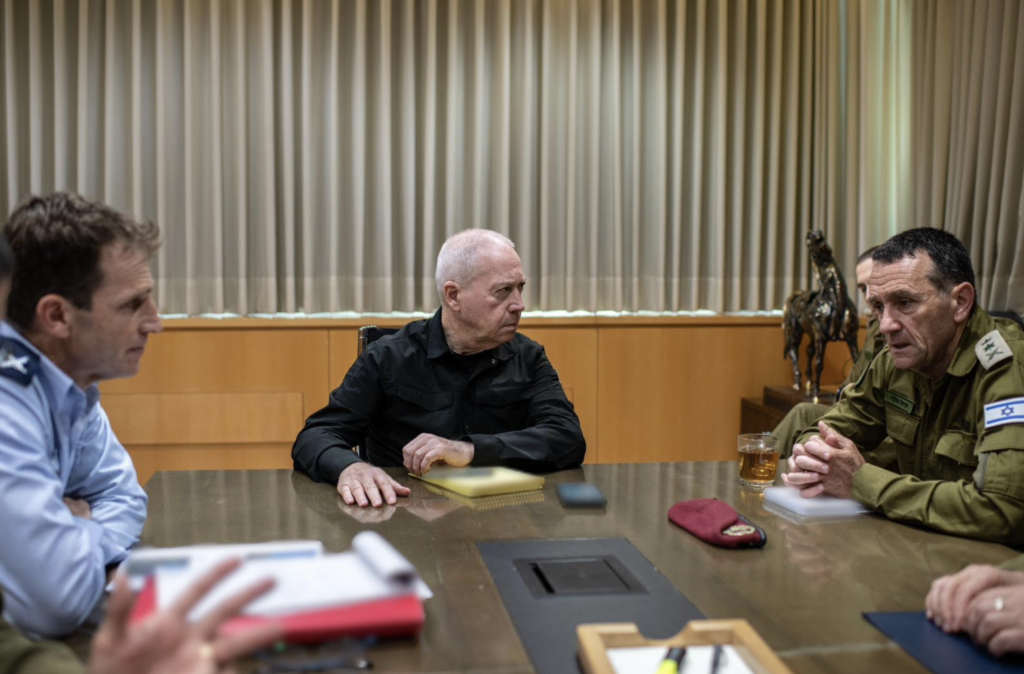
The Israeli Air Force on Saturday hit a Yemen port used by Houthi rebels for smuggling weapons from Iran, retaliating for a Houthi drone attack that hit a Tel Aviv apartment on Friday and killed an Israeli. While the Houthi have launched more than 200 projectiles at Israel since Hamas’ terror massacre on October 7, Yevgeny Ferder on Friday was the first Israeli killed by such an attack.
Following Israel’s counterstrike, the Houhti wasted little time with a response of their own—but it failed to reach its target. The IDF feed on X (formerly Twitter) reported that on Sunday, Israel “successfully intercepted a surface-to-surface missile that approached Israeli territory from Yemen using the “Arrow 3” Aerial Defense System. The projectile did not cross into Israeli territory. The incident has concluded.”
Since October 7, Israel has been attacked by enemies in seven different fronts—Gaza, Lebanon, Iran, Yemen, Syria, Iraq, and the Judea and Samaria region. Yemen’s many prior attacks had failed to kill Israelis due to the air defenses of Israel and its allies, according to Israeli Prime Minister Benjamin Netanyahu. When that failed last week, he saw the need to do more.
“From the beginning of the war, I made it clear that Israel will act against all those who attack us,” Netanyahu said in a press statement Saturday evening. “…The drone attack that struck Israel in the early morning hours yesterday shows that more than defensive action is needed to curtail the Houthis. Offensive action is also needed. It’s needed to ensure that Iran’s terror proxies pay a price for their brazen aggression.”
Israel targeted the Yemeni port of Hodeidah, which Netanyahu noted is “not an innocent port. It’s used as their entry point for weapons that are supplied by Iran to its Houthi terrorist proxies. The Houthis have used those weapons to attack Israel, to attack Arab states in the region, to attack many others.”
Perhaps more than the strategic significance of the port itself is the significance of Israel attacking it directly. The Yemen port is around 1,800 kilometers (more than 1,100 miles) away from the Jewish State. Israeli Defense Minister Yoav Gallant made that point in his press statement following the attack. “The fire that is currently burning in Hodeidah, is seen across the Middle East and the significance is clear,” said Gallant.
“The Houthis attacked us over 200 times. The first time that they harmed an Israeli citizen, we struck them. And we will do this in any place where it may be required. The blood of Israeli citizens has a price. This has been made clear in Lebanon, in Gaza, in Yemen, and in other places—if they will dare to attack us, the result will be identical.”
Mark Dubowitz, the CEO of The Foundation for Defense of Democracies, posted to X and highlighted his analysis that the long-range Israeli attack on Yemen sends a message to Iranian leader Ayatollah Ali Khamenei. Wrote Dubowitz, “Note to Khamenei: The distance between Israel and Hudaydah is 200 km longer than the distance from Israel to Tehran.”
Of note, Israel apparently launched the counterstrike on their own without the assistance of United States fighter jets. A readout of a call between US Secretary of Defense Lloyd Austin and Gallant made no reference to any American involvement. The summary posted to the US Department of Defense website said in the call that Austin “acknowledged Israel’s action followed months of Houthi attacks against the State of Israel. The Secretary reaffirmed the United States’ ironclad commitment to Israel’s security and Israel’s right to self-defense.”
The Houthi attack on Tel Aviv that preceded the Israeli strike on Yemen had Iran’s figurative fingerprints all over it. Per a video posted to the IDF official X feed, the unmanned aerial vehicle (UAV) “appears to be an upgraded Iranian weapon launched from Yemen, proving that it was an attack orchestrated by Iran.”
And it wasn’t just Israel threatened by the attack—the apartment hit was just a block away from the US Embassy to Israel branch office in Tel Aviv. US Ambassador to Israel Jack Lew, on X, said he was “shocked by the brazen Houthi drone attack in Tel Aviv this morning. We offer our condolences to the family members of the individual who passed away. We are thankful our U.S. Embassy Branch Office personnel are all safe.”
The Houthi have also been attacking international shipping for months, with the US and its allies directly fighting back against the Iranian proxy. Now, Israel directly joins that battle.
“In defending ourselves against this Iranian terror axis, Israel stands on the front lines against a regime that threatens the entire Middle East, that threatens the entire world,” said Netanyahu on Sunday. “That is why all those who seek a more secure and stable Middle East should fully support Israel’s actions against this terror axis—in Yemen, in Gaza, in Lebanon and elsewhere.
“And to Israel’s enemies, I have a simple message: Do not doubt Israel’s determination to defend itself on every front. All those who seek to harm us will pay a very heavy price for their aggression.”
(By Joshua Spurlock, www.themideastupdate.com, July 21, 2024)
